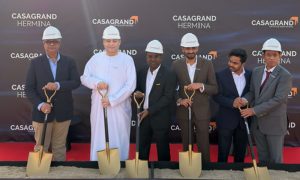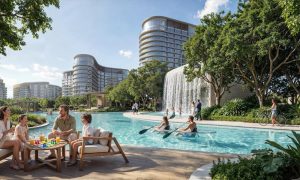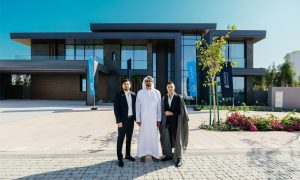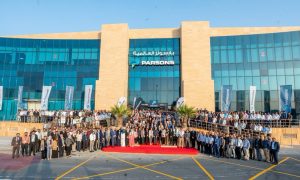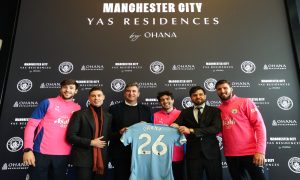In profile: Hamad Al Ameri, Trojan Holding
The engineer explains the changing nature of the UAE construction business

In June 2016, Trojan Holding, an Abu Dhabi-based local construction conglomerate, announced the launch of a countrywide vocational initiative that would give 100 of the UAE’s engineering students an opportunity to gain some invaluable on-the-job experience at its companies.
This was unusual, as one of the first instances of a locally grown, privately owned construction company taking steps to involve the young Emirati population in a way that would stimulate interest in working in the local construction industry.
Targeted at fourth-year engineering students with a GPA of 3.0 and above, the initiative will see local universities put forward ten students every month from June 2016 to March 2017 to spend two full days with Trojan’s team of in-house engineers, where they will get an understanding of the intricacies of working for a construction company, both at head office and on construction sites. At the conclusion of this programme, Trojan will offer the students who demonstrate the right attributes the chance of a one-month internship with the company.
The 100 Trojan Young Engineers initiative is the brainchild of Trojan Holding managing director engineer Hamad Al Ameri. While one might see that this initiative as something of a token gesture, it quickly becomes apparent that it is a cause very close to his heart, as he explains to Big Project ME during an interview at his office at Trojan Holding’s headquarters in the Al Mafraq Industrial Area of Abu Dhabi.
“The initiative will offer engineering students at universities throughout the UAE the chance to shadow Trojan’s teams as they manage the planning, design and execution process of various construction projects,” he says. “Our main goal is to make a difference in the lives of these students by providing them with a platform that allows them to extend their educational knowledge into the skills and tactics required in a practical, corporate workplace.”
“100 Trojan Young Engineers is about more than just the first step on the corporate ladder. It’s about giving back to the community through helping students understand what their future career could hold and exposing them to the fantastic opportunities that a career in engineering can offer.”
Giving back to the community is a topic Ameri returns to frequently over the course of the interview. As an Emirati, he is passionate about developing the next generation of construction professionals in the UAE, and determined to play a part in ensuring fellow Emiratis get a fair chance to contribute to the construction industry.
“I’ve found that a lot of the engineers who graduate in the UAE don’t actually work in the UAE. Why is this? It’s because a lot of the companies aren’t hiring them, they’re not giving them the opportunities. Of course, a fresh graduate will cost a company, but it’s like investing back into your society. I think it’s time for us to let engineers from the UAE – who know the culture of the UAE, who know how the UAE works and who have the knowledge of the UAE – to work in the UAE as well. Therefore, I’ve started this initiative to start reinvesting in my society.”
A civil engineer by training, Hamad Al Ameri started Trojan in 2009 with the launch of Trojan General Contracting (TGC). Since then, the company has grown to include eight subsidiaries in the construction fields, including National Projects and Construction LLC (NPC), which specialises in infrastructure and high-rise projects; Royal Advance Electromechanical Works; Reem Emirates Aluminium & Glass Factory; Hi-Tech Concrete Products; Al Maha Modular Industries; Phoenix Timber Factory; and Reem Readymix.
From starting as the first employee of the business, Ameri has seen his operations grow to the point of having 25,000 staff on the payroll. In the relatively short while since it was founded, the business has managed to establish itself in Russia, Morocco, Jordan, Iraq, Afghanistan, the Seychelles and Belarus, while also cementing its place as a major player in the UAE market, specialising in large-scale residential projects.
“In 2007/2008, if you remember, there was a trough in the business cycle. It was very bad, and by 2009 there were a lot of companies looking to get out of the market. So we said it is an opportunity now to have a local company that can replace the international companies that have left in the middle of the construction of projects.
“So that’s when we started Trojan General Contracting. Within a few years – it’s been almost eight years now – we were at 25,000 workers. What we found when we started TGC was that there was a need in every aspect. When we tried to outsource things, there was always a delay, there were quality problems and so on.
“We wanted to make our own name, and I felt that the market needed a company that was a turnkey company, a one-stop shop. People just want to talk to one guy – a client just wants to get his property finished, regardless of whether it’s just one villa or a full residential city, or a building. That is why we’ve consolidated as Trojan Holdings and why we have a lot of subsidiaries, with each activity related to construction.”
Given the current nature of the economic markets in the region, Ameri’s explanation for diversifying the business makes sense. He says spreading Trojan’s net allows the company and its subsidiaries to win projects and target sectors of the market, keeping the company buoyant in tough times when the business cycle goes down.
“We’re happy with the performance of the group in general. We’re doing a great job, and there’s a lot of opportunities in the market. Regardless of that, there’s also a lot of cutting of costs. Everybody knows that the big projects are on hold so far, but with residential and commercial [projects still ongoing], there’s a need in the market.
“There is no way you’ll end up with no projects in the UAE. We’re a very safe and economically stable country, and there’s always growth happening. And where there’s growth, there’s always opportunities for us.”
To this end, Ameri points to the infrastructure development sector as of particular interest to Trojan Holding in the coming year.
“While business has gone down a little bit, infrastructure work never stops. We have our infrastructure arm within the group, and it helps us get full cities developed, along with working on turnkey projects for clients. It is the arm that we depend on when the business cycle goes down.”
Although Ameri is reluctant to discuss financial specifics in great detail, he insists that all targets have been achieved for the year, while the group has had a very good return overall. Despite the turmoil through the year, he remains sanguine about how things have unfolded.
“We’ve been in this situation before, and we’re going to be in this situation again. If you’re not flexible enough as a company to adapt to the situation and the cycle of business, then you don’t deserve to survive. That’s why a lot of companies have gone out and we’ve taken the opportunities.
“There are very large companies, with huge overheads, but we’re a very lean company. We depend on ourselves, we know how to tackle things and keep it clean. There are a lot of people who depend on very high-end tools, very high overheads, and honestly I think they’re going to go out of this market if it stays like this for one or two more years. And then it’s going to be for us – the local, lean companies.”
However, he acknowledges that companies need to be very selective when it comes to choosing clients and projects, especially when working internationally. With the Trojan group of companies now operating in 11 different countries, Ameri sees this as an opportunity to showcase the best of the UAE construction industry to the world.
“I think we [the UAE construction business] have started to grow and go international. We’re taking our know-how, taking our knowledge and taking our commitment as a country as well, and representing it internationally.
“You have to be very selective in choosing your client and your projects when going international. Other than this, you have to involve the local companies, that helps you put your foot in the door. Without having the knowledge of the country and the people in it, you will not have success,” he says, adding that Trojan has been working in countries where the local market tends to be smaller or marginal, which in turn allows it to benefit from Trojan’s expertise.
Looking at the local region, Ameri says he and his team have been studying opportunities in the GCC for a while. Seeing what countries like Saudi Arabia and Qatar have been going through, he surprisingly goes against conventional wisdom and says he sees an opportunity there.
“Everybody knows that there are a lot of big companies – construction companies – struggling in those markets. I think that there’s a gap there, and where there’s a gap, there’s an opportunity. I know that there’s a lot of difficulties in those countries in terms of getting projects, but I also think that it’s the best time for us [to enter].
“We are financially strong – those countries need a contractor who is financially strong. I think that almost 60% of the contractors there, they’re too financially unstable to take on huge projects there. We, on the other hand, are ready.”
Coming back to the company’s base of operations in the UAE, Ameri says that while he sees Expo 2020 as an expediter for the local construction industry, especially in Dubai, he also thinks there’s more to the country than just the Expo.
“It’s not that if it wasn’t there, we’d end up with nothing. I think that after Expo 2020, we’re going to see that there are a lot of gaps where smaller investors will come in to invest as well. For now, the big developers are developing full cities, but they’re developing landmarks for those cities. The rest has to be completed, and that’s where other people will come in and invest in them. This is a cycle.
“The Expo will be an expediter, but it’s not everything. I’m sure that the UAE is going to win a lot of expediters over the next few years, and we will continue [to prosper].”
As part of his plans for the future, Ameri reveals that while Trojan and its subsidiaries will continue to focus on its traditional strengths of residential and commercial development, the group is looking to explore new avenues.
“We’re also studying the opening of things that we haven’t already opened – the oil & gas sector, the power sector. We’re studying those opportunities to see if it’s feasible for us to go for it. Personally speaking, we’ve been working as a family from the start. I want to keep this family together. I want this family to be bigger. I don’t want my people to think that they’re ‘coming to work’. Instead, I want them to come in and say, ‘I’m here on a mission. I come in here for my family and to finish something for this country.’
“I would love to link my name with the growth happening in the UAE. I’m proud to be a part of the country’s growth, and I hope I can represent it everywhere that deserves to be associated with the name of the UAE,” he concludes passionately.

